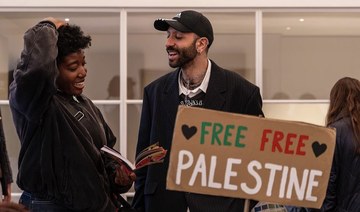Torture is an ugly act. Prisoners throughout history have always suffered the deep psychological scars that have continued to haunt them for years after facing the interrogators’ torture.
Raed Andoni was one of them.
In 1985, at 18 years old, he was arrested and taken from his Bethlehem area home by Israeli soldiers. He was blindfolded and thrown into Al-Mascobia detention center in Jerusalem. His charge was that he belonged to one of the Palestine Liberation Organization’s (PLO) factions.
He was not able to see the facility where he was held. The only thing he was able to see was the sneakers of his tormentor. During the entire interrogation period Raed’s mind was racing. Like so many prisoners in similar situations he tried to keep his mind away from the pressures he was under by triggering other more pleasant images. After the blindfolded interrogation in Al-Mascobia in Jerusalem, Andoni was transferred to various Israeli jails.
“I was taken to the Israeli prison in Hebron, then to Kfar Yona north of Israel and finally I was dumped in the Nafha prison in the Negev.”
The entire interrogation and prison term lasted a year but the memories continue.
Andoni never went to film school, but he has always loved movies. He set up a small video studio in his home in Beit Sahour (the Biblical Shepherds field) near Bethlehem and quickly became involved in filming, editing and animation. Around 2000, he set up a production company appropriately named Star 2000. His production and editing experience allowed his company to win a tender to provide production services to Al-Quds University’s Institute of Modern Media, which was producing “Sha’a Simsim,” the Palestinian version of Sesame Street.
The more he learned about film and animation the more he wanted to be in the driver’s seat as a creative storyteller articulating the Palestinian narrative. He established Dar Films in Ramallah and produced a number of documentaries including “Improvisation,” a film about three Palestinian musical brothers from the Jubran family in Nazareth. Another film allowed him and his audience to travel from Nazareth to Ramallah and capture the huge gap between Israel and Palestine.
He took storytelling a step further when he conducted 20 sessions with the Palestinian psychologist Dr. Fathi Fleifel. He used the interviews to write and produce “Fix ME,” his first feature film that opened in 2009. It was screened at the Sundance Film Festival and the Festival de Cannes and released in European cinemas. It won several prizes, including the SCAM award for Best Documentary of the Year and the Tanit d’Or for Best Documentary at the Carthage Film Festival in 2010.
“All these projects helped me develop my own cinematic language,” Andoni told Arab News by phone from his home in Paris. “Waiting 25 years also allowed me to mature and better reflect on my own experience. I was able to take all these personal and creative experiences to a much bigger step forward.”
His latest effort, an award-winning documentary, “Ghost Hunting,” won the documentary film prize in this year’s Berlin International Film Festival on Feb. 18. The film allowed him an opportunity to carry out a deeper, inner search of his own mind as well as examine the ghosts of fellow former prisoners.
Andoni said that he, like almost everyone he knows, has had his own trauma. His statement is a reference to the fact that according to Addameer Prisoners Support and Human Rights Organization four out of 10 Palestinians have spent time in Israeli jail.
Andoni admits that the film he wanted to produce “Istyad Ashbah” (“Ghost Haunting”) was a complicated project.
“The film deals with an intangible issue of what goes in your own mind. It needed courage and creativity to turn this intangible issue into a cinematic production,” Andoni said.
He said “Fix ME” opened Andoni to the study and reflection of the multi-layered human mind. But the Palestinian filmmaker knew that he needed something more proactive to loosen up images and thoughts that had been laying dormant for years. He decided on a physical act that could help trigger the subconscious. And he needed to do all of this in a creative visual way.
He decided to rent an open parking lot in Ramallah and made a casting call to former Palestinian prisoners who were held at the same notorious prison that Andoni was first held.
“The casting call had a condition,” said Andoni. “It required that those auditioning for the film had to have been held at Al-Mascobi prison and to have building construction experience.”
Andoni wanted former prisoners help with the film’s project design.
“I wanted the prisoners who were blindfolded at Al-Mascobia prison to be pushed to try and imagine what the prison looked like,” he said.
Andoni’s goal was that by jarring their memories to remember the location of corridors, walls and rooms, he could get them to come to terms with their own memories and hopefully conquer their own ghosts.
Andoni used a series of methods to tell the story. In addition to straightforward interviews with former prisoners, he also included actors reenacting interrogation scenes. He also used animation techniques to help present the complexity of issues that he needed to convey.
“While we used different cinematic languages, we were careful to have a unified single narrative,” he said. “This is what made the film full of energy, anger and sarcasm, but in the end it has scenes of happiness as the film subjects got all their anger out and they (started) talking about love and children.”
In receiving the top documentary award at the Berlin festival Andoni refrained from personal glorification.
“I know that the honor of the Berlin festival is an honor to the art in the film but at the same time I know that this art is the result of collective effort,” he said. “I want this film to be the narrative to those in the dark who no one hears of.”
British film director Ken Loach praised “Ghost Hunting.”
“This is a daring and shocking film, made with fine cinematic judgment,” Loach said. “It leaves the audience with a challenge: What do we do in the face of such illegal brutality? Sooner or later the world will have to wake up to this cruel injustice. Raed Andoni, through his talent and commitment, brings that day closer."
Reflecting on the long-term goals of the film, Andoni goes back to the emotional aim of the project.
“The building of the prison allowed us to be released from our own prisons, I hope it can liberate people from the jail within them,” he said. “Many Palestinians did not see the prison they were held in because their eyes were covered. By forcing them to confront their past, hopefully those watching the film will be able to conquer their own ghosts.”
• [email protected]
Palestinian filmmaker attempts to conquer former prisoners’ ghosts
Palestinian filmmaker attempts to conquer former prisoners’ ghosts
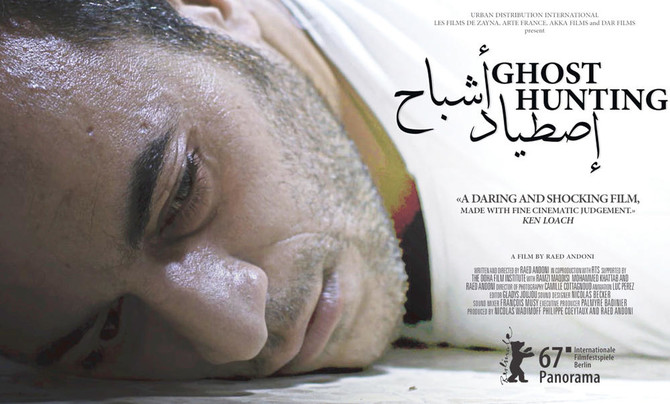
Saudi Arabia’s Film AlUla scores trophies at Global Production Awards
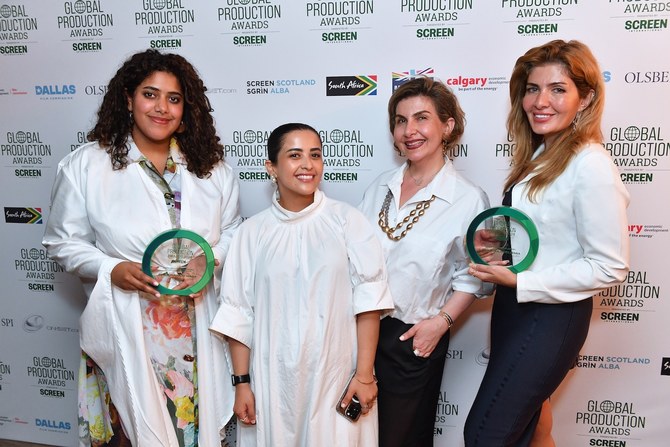
DUBAI: The Royal Commission for AlUla’s film agency Film AlUla on Wednesday received the Emerging Location Award and Film Commission Award at the Global Production Awards held on the sidelines of the 77th Cannes Film Festival.
The award show recognizes efforts in producing and filming movies and shows. It highlights projects that set high standards in sustainability, diversity and local economic benefits from production activities.
Charlene Deleon-Jones, the executive director of Film AlUla, said in a statement: “Less than five years ago, Film AlUla was established to develop a vibrant film industry, while diversifying the local economy, providing opportunities for local filmmakers and fostering global collaboration.
“Since then, we have been dedicated to building the infrastructure, policies, and teams that will transform the lives of a generation of filmmakers and filmgoers alike,” she added.
Film AlUla this week hosted a screening of clips from short films by the first four winners of the AlUla Creates Film Programme, which supports Saudi female directors. The winners received mentoring to turn their ideas into festival-ready films.
On May 23, the film “Norah,” shot entirely on location in AlUla with an all-Saudi cast, will become the first Saudi feature to appear as part of the official selection at Cannes in the 77-year history of the festival.
Saudi filmmakers showcase their upcoming short films in Cannes
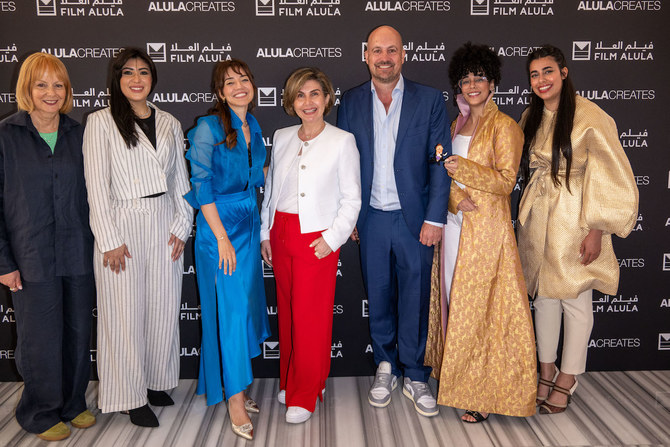
DUBAI: Saudi filmmakers Hana Alfasi, Maram Taibah, and sister duo Raneem and Dana Almohandes showcased snippets of their upcoming short films — which are being created as part of the ‘AlUla Creates: Film Program’ platform — to a select audience of industry professionals this week at the Saudi pavilion during the 77th Cannes Film Festival.
Alfasi, director of “When the Shelves Hymn,” told Arab News: “It’s a great opportunity to have industry professionals attend a screening of a scene from our new short film.
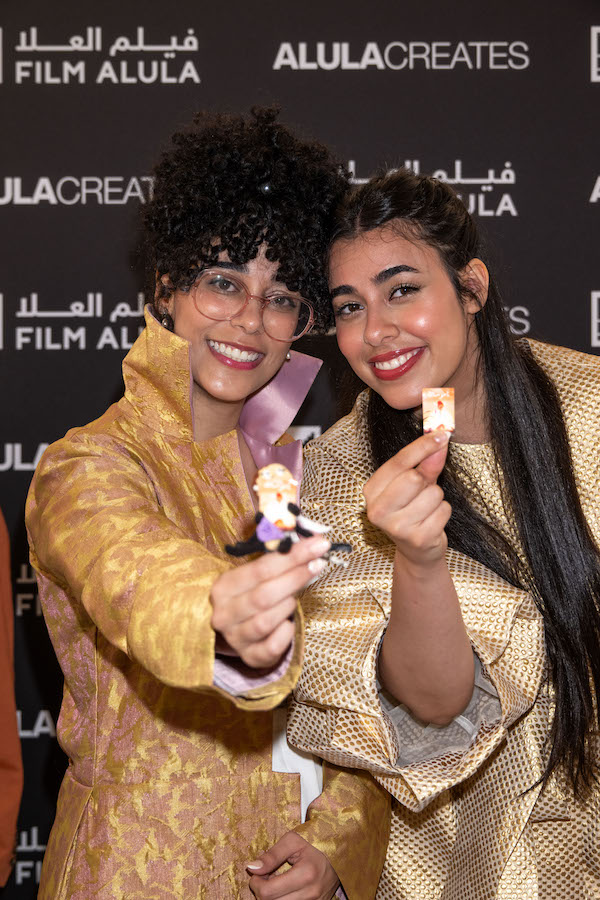
“We hope this film will find its way to A-list festivals, gaining the spotlight it deserves through screenings like the one we’re having today,” she added.
Alfasi hopes that the screening will connect her and her team with more professionals as she prepares to direct a feature film, for which she will need additional financial funding and support.
Taibah’s “Malika” is a short fantasy film about a young girl who goes on an adventure to find her dying grandmother’s lost crown, only to discover unexpected parts of herself, the filmmaker said.
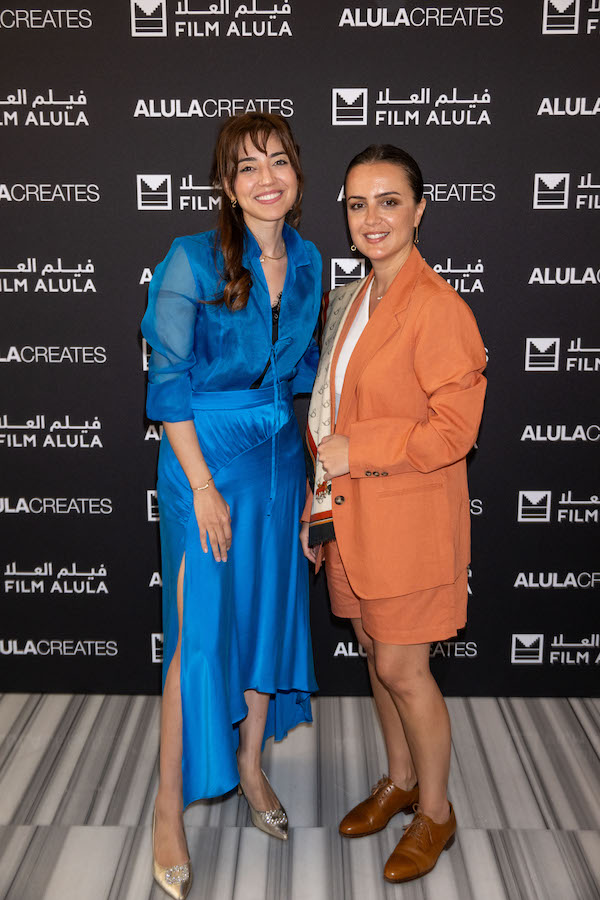
“I’m very proud of what we made. It was such a delightful process to work with such talented visionaries starting from my producer, cinematographer, and casting director to the postproduction team,” Taibah said.
Taibah believes that Saudi Arabia has many untold stories.
“Each filmmaker in Saudi is showing one piece of the tapestry and mine shows the magical side of our culture and the treasured relationships we have with our grannies,” she said. “I hope to share the magic of the film and raise anticipation for the completed piece here in Cannes.”
The Almohandes sisters felt “honored” to showcase their movie “Mosquito” to industry experts.
“Since the beginning of our careers, we always looked forward to showing our films at Cannes and here we are and we’re extremely grateful to the AlUla Creates program for making this happen,” they said.
The sisters just wrapped up the post-production phase of their animated film, which is about an ambitious mosquito who wants to become the Umm Kulthum of the mosquito world, and she goes on a journey to make her dream come true.
Raneem and Dana have big dreams themselves.
“Our dream is to show our stories and share our voices with international audiences,” they said.
“It’s just the beginning with this short film and we aim to have the first Saudi musical here at Cannes very soon.”
Speakers, headliners pull out of UK’s Great Escape festival over Gaza

DUBAI: Keynote speakers and headliners scheduled to take part in the UK’s annual Great Escape music festival in Brighton refused to appear at this year’s event due to the war in Gaza.
According to The Guardian, numerous acts withdrew due to a pro-Palestinian boycott targeting the event’s sponsorship by Barclays Bank. Campaigners allege that Barclays has increased its investments in arms companies that trade with Israel.
Bands Boycott Barclays (BBB), the organization spearheading the campaign, asserted that the bank was engaged in “laundering its reputation” through its association with the music festival, a claim that Barclays refutes.
A BBB spokesperson told the BBC that 163 acts, four showcases and two venues had pulled out of the festival.
The Great Escape is an annual music festival held in Brighton, showcasing emerging artists from around the world. It features hundreds of performances across various venues, along with industry panels and networking opportunities.
It is the event that has been key in launching the careers of artists such as Stormzy, AlunaGeorge, Fat White Family and Anna Calvi.
‘Material Woman’ exhibition in London creates synergy of Arab women’s fashion and art

- Curation tells a “story about how women use their hands to craft their destinies,” Shoucair says
LONDON: The worlds of fashion and art from Arab female creatives converged this week at the “Material Woman” exhibition in London.
The exhibition, held from May 17 to May 19 at Soho Revue, is the brainchild of the art collective Hayaty Diaries, in collaboration with the fashion platform and pop-up series 3eib.

Featuring an eclectic mix of sculptural art, mixed media, projection installations, fashion and jewelry, the exhibition explored craftsmanship and materiality.
“Each element came together to tell a cohesive and beautiful story about how women use their hands to craft their destinies and honor their heritages through both creative worlds of art and fashion,” Lebanese curator and Hayaty Diaries co-founder, Christina Shoucair, told Arab News.
The curatorial process began with the pairing of artists and designers, creating a harmony between the works.

Bahraini artist Zayn Qahtani’s shrine-like objects, featuring delicate ethereal drawings on date paper, explore themes of venerative mourning. These are paired alongside a series of rustic sculptures and draped garments by Egyptian designer Nadine Mos.
Lebanese artist Yasmina Hilal’s photo sculptures, which incorporate her distinctivve metalwork and soldering technique, are complemented by a curated display of contemporary silver and gold accessories by Celine Dagher, a Lebanese jewelry designer.
Meanwhile, Egyptian artist Hanya Elghamry examines the process of remembering by graphically recreating various details and narratives in her installation “Abandoned Projection.” Set as a backdrop against her floating “Tampered Redux” series, along with Moroccan designer Hanan Sharifa’s mesh and delicate dresses, the space offers visitors an immersive experience.
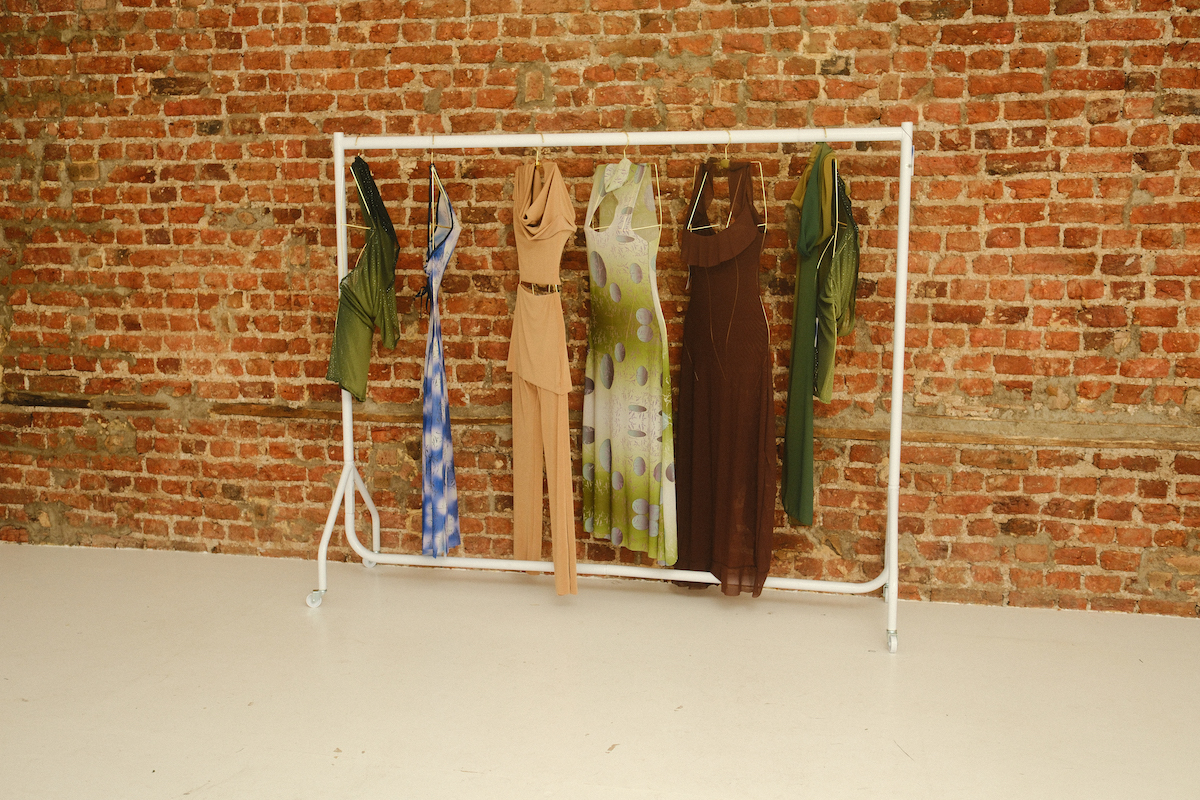
“Christina and Kinzy presented the vision for The Material Woman and I loved the idea of blending the worlds of fashion and art together and utilizing the theme of materiality as a vehicle of creative empowerment and liberation,” 3eib founder, Dania Arafeh, told Arab News.
Hayaty Diaries, which focuses on celebrating the artwork of Arab women, marked its debut last December with its inaugural exhibition, “Through Their Eyes: Perspectives Unveiled,” in the British capital.
“Our Hayaty Diaries journey has been incredible. We’ve had the privilege of meeting many creatives from the region and have felt the warmth and support of the community. We are immensely grateful for all the encouragement we have received along the way,” Egyptian-Saudi curator and Hayaty Diaries cofounder Kinzy Diab told Arab News.
The London-based collective is now preparing for its exhibition “Levitate,” which will run from June 6 to June 16 and center around themes of fantasy and imagination.
Hoor Al-Qasimi appointed artistic director of the Biennale of Sydney

DUBAI: The Biennale of Sydney announced this week that Emirati creative Hoor Al-Qasimi will become its artistic director for 2026.
The 25th edition of the biennale will run from March 7 to June 8.
Since its inception in 1973, the biennale has grown to become one of the longest-running exhibitions of its kind and was the first biennale established in the Asia-Pacific region.
Al-Qasimi created the Sharjah Art Foundation in 2009 and is currently its president and director. Throughout her career, she acquired extensive experience in curating international biennials, including the second Lahore Biennale in 2020 and the UAE Pavilion at the 56th Venice Biennale in 2015.
In 2003, she co-curated the sixth edition of Sharjah Biennial and has remained the director of the event since.
Al-Qasimi has been president of the International Biennial Association since 2017 and is also president of the Africa Institute. She has previously served as a board member for MoMA PS1 in New York and the UCCA Center for Contemporary Art in Beijing, among other roles.
She is also the artistic director of the sixth Aichi Triennale, scheduled to take place in Japan in 2025.





